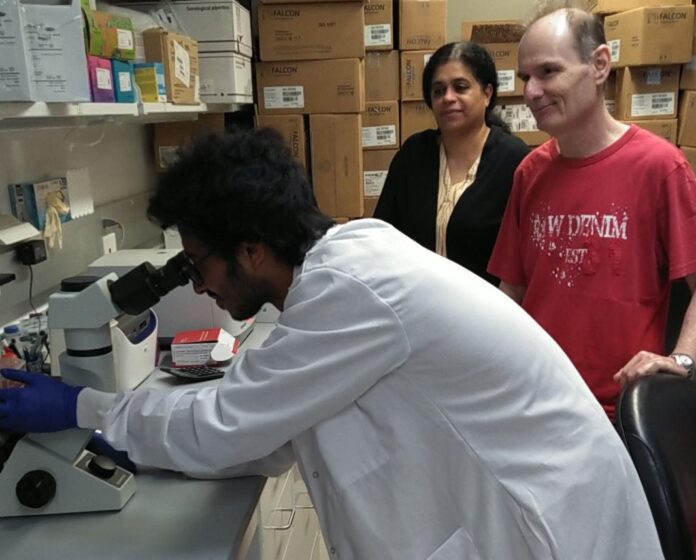
Cancer patients may have a better chance of recovery thanks to a discovery by a research team at the University of Louisville. In a new preclinical study, they have found that an existing drug, approved by the Food and Drug Administration for another disease, also may improve success rates for cancer immunotherapy when the two are used in combination.
Immune checkpoint inhibitors (ICI) are a promising form of cancer immunotherapy, treating cancer by activating the patient’s own immune system. While patients whose cancer responds to ICI treatment experience excellent results, a large percentage of patients fail to respond to the therapy. One of the causes of poor response is due to the presence of certain immune cells within the tumor that lead to elevated levels of adenosine, a compound found naturally in cells that causes immune suppression when present in high levels.
In the new study, the UofL researchers have enhanced the response to ICI therapy by combining it with PEGylated adenosine deaminase, a drug already approved by the FDA that reduces levels of adenosine. The study, led by Kavitha Yaddanapudi, associate professor in the Division of Immunotherapy, the Hiram C. Polk, Jr., MD Department of Surgery and researcher with the UofL Health – Brown Cancer Center, was published June 30 in Science Advances.
Using lung, melanoma and breast cancer animal models and patient cell samples from the Brown Cancer Center biorepository, the team showed that when PEGylated adenosine deaminase is used in combination with ICI therapy, cancer-fighting T cells become more active, thereby attacking the tumor.
“This is a very exciting discovery. We found one particular mechanism by which the adenosine levels were going up in the tumors and what we can do to mitigate it,” Yaddanapudi said. “And when we combine this drug with immune checkpoint inhibitor therapy, we get a very nice synergistic effect in the tumor control.”
PEGylated adenosine deaminase is FDA approved for lifelong use in children with immunodeficiency to increase their immune function.
“This is a drug that has been FDA approved for use in kids for a different disease and now we are repurposing it for cancer, so we hope it can quickly go into the clinic to confirm its ability to enhance immunotherapy in patients,” Yaddanapudi said.
“If it turns out to be an effective drug, it subverts both a natural defense mechanism against inflammation (elevated adenosine) and is an already approved agent (by the FDA),” said John Eaton, professor emeritus in UofL’s Departments of Medicine and Pharmacology & Toxicology and study team member and co-author.
The discovery has the potential to further reduce deaths from cancer, according to Jason Chesney, director of the UofL Health – Brown Cancer Center.
“ICIs have markedly improved the long-term survival of certain cancer patients and have reduced cancer death rates across the world,” Chesney said. “Many cancer patients do not respond to ICIs, but Dr. Yaddanapudi’s exciting discovery opens the door for human trials combining ICIs with PEGylated adenosine deaminase to overcome this resistance.”
































